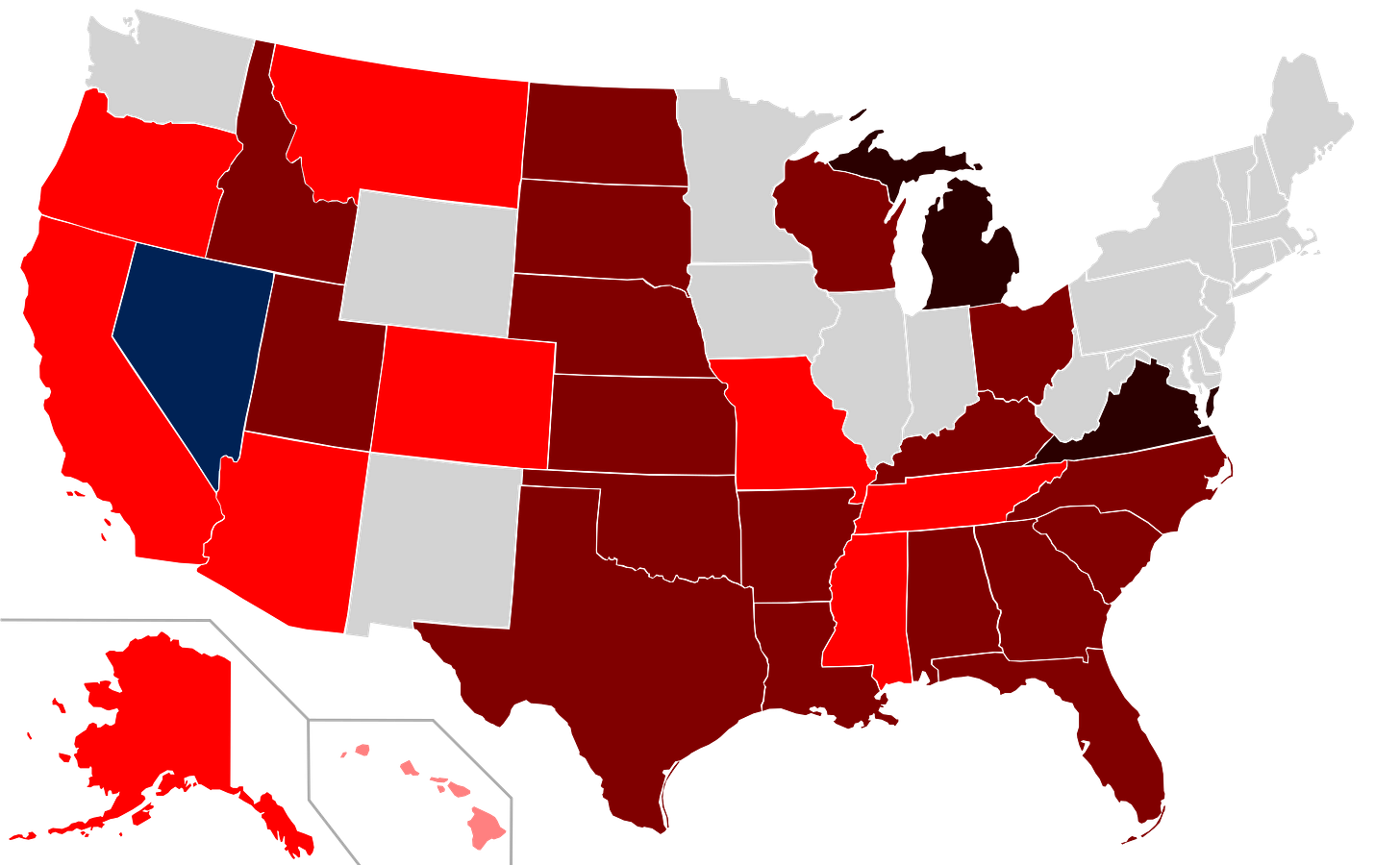
[Hey there! This blog will always be free to read, but it’s also how I pay my bills. So, if you like what you read, please consider a paid subscription.]
This Wednesday, Senate Majority Leader Chuck Schumer will bring the Respect for Marriage Act to the floor for a vote — the piece of legislation meant to protect marriage equality in the event that this current Supreme Court eventually decides to overturn Obergefell v. Hodges, the landmark case that legalized same-sex marriage in 2015.
This past July, the House overwhelmingly passed their version of the bill, with 47 Republicans joining the full Democratic caucus (and seven GOP members not voting).
Action on the Senate version of the bill was delayed until after the midterm election in what was seen as a clear effort to garner necessary GOP support in exchange for the issue not being weaponized against them in the final stretch of campaigning.
So, here we are: on Monday, Senators Tammy Baldwin (D-WI), the bill’s leader, and Kyrsten Sinema (who caucuses with the Democrats) were joined by GOP Senators Rob Portman (OH), Susan Collins (ME), and Thom Tillis (NC) in a statement describing how the bill addresses the controversy of this issue and urging their colleagues to support its passage.
The vote on Weds. is for cloture, the part of this whole process in which the full Senate advances a piece of legislation to a final vote by moving to restrict debate (otherwise known as overcoming the filibuster threshold of 60 votes). That cloture vote will set a time limit of 30 hours for consideration on the bill, and then, a final vote can be taken on whether or not to pass it. (Obviously, successful cloture votes almost always lead to final passage.)
So, by the end of Friday, unless we’re due for some big, unforeseen surprise, millions of families will have an additional layer of protection against marriage discrimination.
Sounds great, right? Not so fast.
You’ve probably heard about this bill along with the word “codify”, as in: this bill will codify marriage equality into federal law.
It will not. The word “codify” has been used very fast and loose by much of political media over the past 24 hours in describing this bill, and it’s just plain wrong and deeply misleading.
Here's what the bill does specifically regarding marriage licenses:
1. It requires the federal government to recognize same-sex marriage licenses. If Obergefell should fall, the federal government would still protect those marriages in every aspect under its purview (everything from Social Security benefits to military families).
2. It requires states that would not issue same-sex marriage licenses to recognize those licenses issued in states where legal. If you read the senators’ statement, this is what they meant by “the bill would guarantee that valid marriages between two individuals are given full faith and credit, regardless of the couple’s sex, race, ethnicity, or national origin”. That’s referencing Article IV, Section I of the Constitution. Basically, a same-sex marriage license issued in California would be honored in Texas, even if Obergefell is overturned and Texas bans same-sex marriage licenses from being issued under its state authority.
This is problematic for many reasons, one of the more obvious of which is that not every family living in an anti-LGBTQ state can travel to a pro-LGBTQ state to procure a marriage license. (You know those periodic reminders about why people can’t simply move out of hurricane zones because it costs money to move and restart somewhere else? Same principle here. Many folks can’t afford this nonsense.)
Currently, the constitutions of thirty states—in some way, shape, or form—ban same-sex marriage, and have only been prevented from being enforced by Obergefell. If that precedent should fall, all of those state constitutional bans would be enforceable unless repealed before then.
In 2020, Nevada became the first (and so far, only) state to repeal its constitutional ban on same-sex marriage.
Here, I’ll make it a bit easier with a visual I shamelessly stole from Wikipedia. Do you see all that red and black? Those are various degrees of bans (some just marriages, some both marriages and civil unions, and some go further than that). Everyone living in those parts of the country will be unable to procure a same-sex marriage license where they reside.
Some of these would certainly be repealed before then (California and Oregon) and some would not (Mississippi, Arkansas, etc.)
So, why not pass a bill that guarantees full marriage equality throughout the United States? That’s where this gets upsetting and complicated.
First, the bill would get challenged and probably thrown out for legal reasons that are too complicated to get into here within space constraints and which I, frankly, don’t feel qualified to convey with 100% accuracy.
Bigger to me is the most immediate problem: even with marriage equality more popular than ever (Gallup reported 71% support for it among Americans this past June), we simply cannot reach 60 votes to overcome a filibuster. There are not ten Republican senators who would support full marriage equality.
You might be thinking: gee, if Americans overwhelmingly support this, wouldn’t GOP senators face consequences at the ballot box for failing to support it?
Some would! Most would not — at least not enough to be the deciding factor. We just don’t have ten Republican senators who are vulnerable enough — or, perhaps, feel vulnerable enough — to be pressured into supporting a full marriage equality bill.
This is not unique. Last year, Gallup reported 55 percent of Americans identify as pro-choice, the highest rate taken by the survey since 1996, and yet, despite recent electoral losses that were clearly due to the Dobbs decision, the vast majority of Republican elected officials clearly do not feel much pressure to change their policy views on abortion access.
The GOP, true to form, would rather take their chances with their base on this issue in an election. They think it's worth the risk.
I'd like to believe most of them are wrong, and it'd be great if we could assume this will be enough of an issue that gets enough of them defeated in 2024 to make the difference. But that scenario is an entanglement of assumptions that risks everything.
Start here: the 2024 Senate map is brutal for Democrats. 33 seats will be up, 23 of them ours. We know that we *will* have tight Democratic incumbent seats to defend in Arizona, Maine, Michigan, Montana, Nevada, Ohio, PA, and West Virginia. That’s at least eight seats.
The GOP has maybe three: Florida, Missouri, and Indiana. And I'm being generous to us by saying those are "maybe" tight seats. I'm also being generous by not including Virginia for us because Sen. Tim Kaine is a strong incumbent. But that seat is far from guaranteed.
But we're not done yet. Some of our incumbents may retire or decline to run again. Possible are Jon Tester (Montana) and Angus King (Maine, who caucuses with Democrats). We could lose a critical incumbency advantage in Maine and Montana.
Then there's ticket-splitting. That's a significant disadvantage in swing states for a president's party. Enough voters could decide to keep Pres. Biden but vote for a GOP senator.
I don't think that folks realize that we are already at steep odds against holding the Senate in 2024. The odds are definitely against us. It's partly why getting Rev. Warnock (D-GA) reelected next month is so important. He could be the seat that makes the difference for the long haul.
It’s quite possible we barely break even in 2024 (and honestly, that feels overly optimistic), and the Reverend’s seat wounds up keeping us at 50-50.
And if Manchin, who is up for reelection in 2024, does win and is part of that 50-50, we may not get a chance to revisit legislation like this, anyway.
I think it is very foolish to assume that we'll be able to put full protections in place after the 2024 election if Obergefell is overturned.
It could very well happen that we somehow do way better-than-expected, reelect Pres. Biden in a landslide, and still fall just short of holding the Senate. What then?
No, I think it is completely ridiculous to risk everything on a hope and a prayer that we outperform against bad Senate odds in 2024.
In the meantime, we can considerably shore up protections with this bill.
I'm not happy with it. I'm angry, and I'm worried. I think these Republicans are hypocritical bigots, and it infuriates me that they're encouraging and leveraging hatred for their own bottom line. I am enraged at their cynical pandering. This bill pisses me off.
But it’s not about me being happy. It’s about survival. It’s about putting up a wall of protection that could shield millions of families from state-sanctioned discrimination.
We don't have any other reasonable options here.
But if we do pass this, we'll have protections for millions of families that otherwise wouldn't have had them, and then, we'll keep fighting for more.
It’s painfully slow, incremental progress. Disheartening and exhausting and necessary.
Every senator needs to vote for this bill.
Hi, I’m Charlotte Clymer, and this is Charlotte’s Web Thoughts, my Substack. It’s completely free to access and read, but it’s also how my bills! So, please do kindly consider upgrading to a paid subscription: just $7/month or save money with the $70/annual sub. You can also go way above and beyond by becoming a Lifetime Member at $210.














Share this post